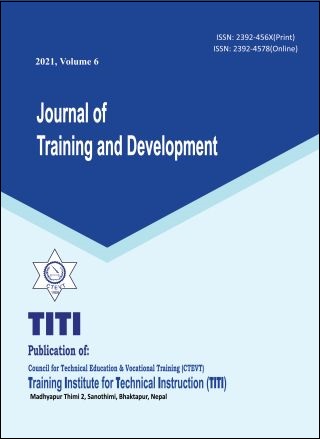Use of Mobile Application for Communication, Interaction and Learning: Lessons from an Action Research
DOI:
https://doi.org/10.3126/jtd.v6i01.41781Keywords:
Mobile App, Activity Theory, E-learning Platform, Action Research, Communication, Interaction, ConnectivismAbstract
Integration of mobile technologies into training and instruction for learning facilitation is important these days. It is because the users of the mobile devices are increasing as enablers of the learning opportunity anywhere all the times. In addition, learners like to get information, learning resources and activities on their palms via mobile devices. In this context, this paper reports lessons from action research about the use of customized android mobile application at a teacher education institution in Nepal. The research started with the purpose of promoting the use of Mobile App for e-learning that contributes to improving access to e-learning resources and instant communication for course activities. Online survey, informal interaction and interview were used to collect data. Activity theory has been influential to analyse the use of Mobile App for the learning facilitation. The research shows that the course facilitators rarely used Mobile App, instead they liked using web browsers in their large computer screen. However, students used the Mobile App and they wanted the updated version with user-friendly interface. Main lesson from the research is that the roles of institution and facilitators are important to create and provide mobile friendly options of learning facilitation where students themselves can explore in the internet, learn, and use available applications and tools required for their learning. Training institutions can introduce mobile application to bring about a change in the ways of training methods and pedagogical practices with technological interventions. Trainers can consider mobile apps for techno-friendly instructional experiences. Also, learners can access mobile apps for training resources and other learning to enhance their knowledge and skill.
Downloads
Downloads
Published
How to Cite
Issue
Section
License
Copyright (c) 2021 Shesha Kanta Pangeni

This work is licensed under a Creative Commons Attribution 4.0 International License.
Authors who publish with this journal agree to the following terms:
- Authors retain copyright and grant the journal right of first publication with the work simultaneously licensed under a Creative Commons Attribution License that allows others to share the work with an acknowledgement of the work's authorship and initial publication in this journal.
- Authors are able to enter into separate, additional contractual arrangements for the non-exclusive distribution of the journal's published version of the work (e.g., post it to an institutional repository or publish it in a book), with an acknowledgement of its initial publication in this journal.
- Authors are permitted and encouraged to post their work online (e.g., in institutional repositories or on their website) prior to and during the submission process, as it can lead to productive exchanges, as well as earlier and greater citation of published work (See The Effect of Open Access).




